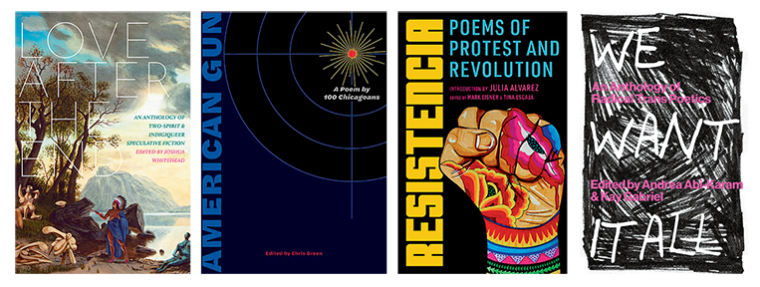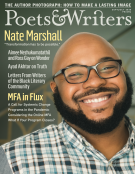Among the many new books published each season is a shelf full of notable anthologies, each one showcasing the work of writers united by genre, form, or theme. The Anthologist highlights a few recently released collections, including American Gun: A Poem by 100 Chicagoans and We Want It All: An Anthology of Radical Trans Poetics.

When compiling Love After the End: An Anthology of Two-Spirit and Indigiqueer Speculative Fiction (Arsenal Pulp Press, September 2020), editor Joshua Whitehead writes that it was important “to queer it towards the utopian.” He adds: “We have already survived the apocalypse—this, right here, right now is a dystopian present.” The result is a collection of stories from writers such as Darcie Little Badger, Adam Garnet Jones, and Mari Kurisato that “enumerate the beauty, care, deadliness, and majesty of Two-spirited folx from a variety of Indigenous nations.”
![]()
In American Gun: A Poem by 100 Chicagoans (Big Shoulders Books, May 2020), established luminaries, teen writers, and other Chicago poets contribute stanzas to a collaborative response to gun violence in their city’s streets. Editor Chris Green chose to shape the poem as a pantoum—a traditional form in which lines recur—to mimic the action of an automatic weapon and the cyclical nature of violence. Poets continue to add to the book, which is available as a free e-book at bigshouldersbooks.com/americangun.
![]()
Resistencia: Poems of Protest and Revolution (Tin House Books, September 2020), edited by Mark Eisner and Tina Escaja, comprises urgent, incendiary verse from writers across Latin America. Translators, including former U.S. poet laureate Juan Felipe Herrera, offer English translations alongside the poems in their original languages; many appear here in English for the first time.
![]()
We Want It All: An Anthology of Radical Trans Poetics (Nightboat Books, October 2020), edited by Andrea Abi-Karam and Kay Gabriel, engages and interrogates poetry as a means of trans liberation. Offerings from poets such as Ching-In Chen and Aaron El Sabrout “pursue the particular and multiple trans relationships to desire, embodiment, housing, sex, ecology, history, pop culture, and the working day.”









